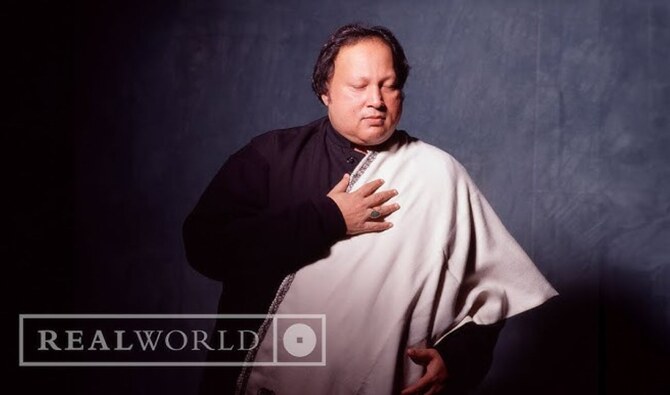ISLAMABAD: Chain of Light, a “lost album” of legendary Pakistani musician Nusrat Fateh Ali Khan, has been released on YouTube, the owner of the album’s production company said on Friday, following a series of launch events in Pakistan and abroad.
Chain of Light is a collection of previously unheard recordings of Nusrat and his Qawwal party made at Real World Studios in 1990, when the singer was at the height of his vocal capabilities. Carefully restored from the original analogue tapes, the album includes a pristine recording of the much-loved classic ‘Ya Allah Ya Rehman’ as well as the only known performance of ‘Ya Gaus Ya Meeran.’
The British Council supported the project, with its launch events taking place in Islamabad, Lahore, Karachi, Manchester, Birmingham, London and Paris in the lead up to the official release on Friday.
In a post on X, English singer and songwriter Peter Gabriel, who owns the Real World Records, shared an excerpt from a short film about the story of the album’s re-discovery in the archives of his music production company.
“The new album by @nusratofficial, Chain of Light, is out today on @RealWorldRec,” he said. “It’s available to watch in full on the Real World [Records] YouTube channel.”
The project is a collaboration of Pakistan-based Saiyna Bashir Studios, who have been also working on a documentary biopic on the music maestro titled ‘Ustad,’ and Gabriel’s Real World Records. The ‘Ustad’ documentary is slated for release in late 2025.
Last month, British High Commissioner to Pakistan Jane Marriott hosted the highly anticipated launch of the album in Islamabad.
“Chain of Light is not just about rediscovering a lost masterpiece of Nusrat Fateh Ali Khan, it’s about reigniting the cultural connection that his music has always fostered between Pakistan and the world,” Maarya Rehman, deputy director at the British Council Pakistan, said in a statement ahead of the Islamabad launch.
“Through these launch events we hope to celebrate his enduring legacy and the universal language of music that transcends borders and unites us all.”
The late Nusrat is universally recognized as one of the greatest voices in musical history and played a pivotal role in bringing Qawwali, a Sufi devotional music tradition, to the Western world. In his lifetime, he collaborated with many Western musicians, including Peter Gabriel, Eddie Vedder, lead vocalist, primary lyricist, and one of three guitarists for the rock band Pearl Jam, and Michael Brook, whose collaborations with musicians around the world have made him one of the most sought-after producers in the music industry. Nusrat’s vocals appeared on soundtracks to films directed by legends like Martin Scorsese, Oliver Stone and Tim Robbins.
Even today, on Spotify, Nusrat is one of the top 10 most listened to artists. According to Spotify Analytics, a substantial 37 percent of Nusrat’s listeners are between 18 and 22 years old. The second largest segment is 23 to 27-year-olds with 24 percent, while 28-34 year-olds along with those under 18 years of age make up 14 percent of his audience respectively on the audio streaming service.
USTAD THE FILM
Saiyna Bashir Studios, an Islamabad based production company, has spent the last three years researching, developing, and raising funds for a documentary film on the life, death and music of Nusrat. The team have filmed Nusrat’s long standing collaborators Peter Gabriel and Michael Brook as well as two Nusrat biographers, the ethnomusicologist who inducted Nusrat to the University of Washington in Seattle as a professor, Nusrat’s childhood friend and physician, his secretary, and his devoted tabla accompanist.
Nusrat’s manager and translator Rashid Ahmed Din, who has also translated the new album Chain of Light, was also interviewed recently.
“It was during the production of the teaser that the team became privy to the existence of a new album,” the British Council said in a statement.
“With Real World Records’ permission, musician Michael Brook played the filmmakers excerpts from Chain of Light — an on-camera ‘first look’ effectively.”















